The Music Partnership – Sliver Award
We are delighted to announce that Eaton Park has been awarded the Excellence in Music…
Maths at Eaton Park
Subject leader: Mr Williams and Mrs Thorne
Subject Coach: Mrs Bell
Link governor: Anthony Simpkin
Intent
Mathematics is a tool and a skill that we believe all of our pupils need to acquire and master to be successful in life and in other aspects of the curriculum. It is a whole network of concepts and relationships which provide a way of viewing and making sense of the world. It is used to analyse and communicate information and ideas and to tackle a range of practical tasks and real life problems. It also provides the materials and means for creating new imaginative worlds to explore. At Eaton Park Academy, we use a mastery approach to mathematics in all of our teaching, ensuring that children are able to apply the curriculum in a more complex and in-depth way. Mastery in maths demonstrates how skilfully a child can apply their learning – it is not just knowing a fact, but using that fact in increasingly more complex and abstract situations across a range of mathematical strands.
Using the 2014 National Curriculum for Mathematics, it is our aim to develop:
We would like to introduce ourselves as Mr Williams and Mrs Thorne – the maths leaders here at Eaton Park Academy. Within this role, we oversee mathematics from Nursery to year 6 ensuring that our children are prepared for their next step in their educational journey. We are dedicated to fostering a love for mathematics and nurturing a growth mindset in our pupils. We see success in Mathematics as a powerful tool for social mobility, giving children the knowledge, communication skills and problem-solving ability to be productive citizens in every aspect of life. Through engaging, practical lessons, and real-world applications, we aim to develop strong numeracy skills and problem-solving abilities. Our goal is to empower students to think critically, communicate mathematically, and approach challenges with resilience and confidence. By creating a supportive and inclusive learning environment, we strive to ensure that every child reaches their full potential in mathematics and is prepared for success in the future. We adopt a ‘mastery’ approach to Mathematics, prioritising success for all children in every lesson through skilful teaching and the use of manipulatives and pictorial representations to represent mathematical concepts. We aim to ensure that all children can achieve with the use of quality scaffolds and impactful support within lessons to allow them to reach their full potential.
During lessons, pupils are supported in a safe and calm environment where mistakes are celebrated as key learning opportunities, which in turn encourages children to take more risks in their maths lessons, removing the fear of being wrong. As leaders, we ensure that training is provided for staff through a range of opportunities. Such as: sharing best practice across the academy and trust; externally provided courses; self-directed training online and through teaching and learning meetings. We regularly meet with our key link governor, Mr Simpkins and Mr Hyder, Alpha Academies Trust Standard Lead for Maths. During these meetings, we discuss and review the standard of maths at Eaton Park, looking at current practice as well as planning next steps.
We aspire for every child to achieve daily success in Maths, leaving each lesson not only with new knowledge but with a love of the subject.
Curriculum
Our curriculum design at Eaton Park Academy focuses on developing a depth of understanding that ensures the children can build on the concepts that they have previously been taught successfully. We understand that particular areas of the curriculum take more time than others and are therefore not restrictive in our long term planning, but instead we allow our staff to be flexible with their planning, suiting the needs of the pupils within each cohort. Planning of lessons is based upon teacher’s Assessment for Learning judgements as well as summative data, and lessons are created and supported with high-quality resources that challenge all pupils. We believe that the concept of mastery can be achieved by all if children are given the time to explore and embed new skills and concepts in a range of ways. Children are constantly shown the same thing in different ways (conceptual variation) – we believe that taking time with this allows children to make better links and to become deeper thinkers and learners in maths.
At Eaton Park, we wish our children to have a strong understanding of the place value of numbers, applying this to calculation methods both mentally and in writing. We use our displays to model and support the children’s ability to justify and explain their mathematical reasoning when solving questions – this in turn means children begin to notice when their answers seem unreasonable and can correct them independently. We champion the idea of making mistakes, encouraging children to develop resilience when problem solving and instilling the MASTER values of enthusiasm and success. Our children develop a good understanding of spatial awareness and shapes and can interpret a range of graphs accurately. Staff encourage and nurture every pupil’s ability to make links and see relationships and patterns between the different mathematical strands.
Our sequences and lessons follow the system of fluency, reasoning and problem solving – during all lessons, resources are geared to moving children towards being able to apply their basic skills in a wider range of situations with an increasingly complex style. Maths is further supported in other areas of our curriculum, most especially in geography and science, which allows learning to become more meaningful and inspires the children to apply maths in other contexts.
Mastery within the curriculum
Mastery within mathematics is achieved when a child has become secure in a concept, securing it within their long-term memory, which allows them to utilise the information in other contexts with confidence and ease. Mastery at Eaton Park is shown through these three elements:
Fluency – a child’s understanding of the basic skills, facts and concepts
Reasoning – how well a child can articulate their understanding of a skill
Problem solving – solving problems, testing out ideas and using different processes to reach an answer/s
Maths is taught as a whole class at Eaton Park to ensure that children are all given the same level of exposure to the curriculum content areas. By using a range of scaffolds, we are able to support children in achieving their learning outcomes. These can be in the form of T.A support, concrete apparatus, modelling, worked examples and visual representations. The aim is that these are temporary levels of support which can be removed as children become increasingly confident and independent.
Our inclusive approach to the teaching of maths helps pupils to achieve mastery through the development of mathematical fluency which is built upon within each lesson. Within our quality first teaching, we aim to focus on the depth of learning, rather than accelerating through new learning. This supports pupils in becoming fluent mathematicians who are able to apply their skills confidently in a range of contexts, both when reasoning and problem solving.
Our pupils are encouraged to be independent learners, taking risks and making mistakes are celebrated as a way to learn and improve. Children work through clear and progressive activities which stretch and challenge them appropriately.
It is clear as soon as you enter any maths lesson within Eaton Park that our pupils thoroughly enjoy their learning and that they are not fazed by challenge, but instead thrive upon it.
Early Years Foundation Stage
The EYFS mathematics curriculum is a rich curriculum which allows children to develop a secure understanding of number to ensure that they are able to excel mathematically.
Our maths lessons are very practical, hands-on and driven by mathematical vocabulary. Children are encouraged to reason and explain their answers, giving justifications behind their thinking.
Our aim is for the children to become confident in core mathematical skills and to develop a secure base of knowledge which can be built upon as they enter KS1. We want pupils to develop their ‘number sense’, enabling them to understand numbers and their relationships
Within EYFS, our children are encouraged to explore the many maths areas both inside and outside of the classroom. The activities are practical and have a focus around using concrete apparatus such as Numicon and counters to support them in achieving the learning outcomes. There are also plenty of opportunities for children to explore mathematical concepts and broaden their curiosity through exciting maths activities within sand and water as well as problem solving activities.
Objectives for learning within mathematics are derived from the Development Matters document for each stage of development to ensure that teaching is progressive across the EYFS department and within year bands. This then leads to the expectations outlined in the Early Learning Goal which are outcomes that we aim for the pupils to achieve at the end of Reception.
Assessment in EYFS is carried out through guided activities with the children; planned observations; incidental observations and through teacher knowledge of the children. All assessment evidence is stored within the child’s individual online learning journeys (Learning Book) or maths books. Evidence gathering within maths takes the form of observations, photographs and children’s work, both guided and independent within the continuous provision.
Cross curricular maths
The National Curriculum document for maths states that maths should ‘support learning across the curriculum’, and this is why our learning links where possible back to maths. This could be through using, creating and analysing graphs in science or geography. Measuring is a key skill that children utilise through the elements taught in Design and Technology lessons, our Creation Station is the perfect place for children to practically measure food ingredients whilst also developing a key life skill: cooking. Counting beats and understanding the value of different notes in music lessons is another opportunity for exploring maths, understanding halving the value of a crotchet to get a quaver and so on. Through map work, children can explore co-ordinates in context, looking at OS maps to create increasingly more complex co-ordinates. In Y6, these position and directional skills linked to map work are used by children to complete orienteering tasks. Shapes are explored in art and through design too. We also encourage children to see maths outside of the school curriculum and how people use maths in everyday life. Our sports coach continually considers how to build ‘Active Maths’ into his lessons, thinking about problem solving whilst exercising or even sometimes making graphs to show their progress in athletics.
Our focus on Maths is Everywhere is key in all of our learning and is showcased on displays in each of our corridors and via classroom doors – staff and pupils are able to share with each other where and when they have used maths in and out of the classroom.
The National Curriculum document for maths states that maths should ‘support learning across the curriculum’, and this is why our learning links where possible back to maths. This could be through using, creating and analysing graphs in science or geography. Measuring is a key skill that children utilise through the elements taught in Design and Technology lessons, our Creation Station is the perfect place for children to practically measure food ingredients whilst also developing a key life skill: cooking. Counting beats and understanding the value of different notes in music lessons is another opportunity for exploring maths, understanding halving the value of a crotchet to get a quaver and so on. Through map work, children can explore co-ordinates in context, looking at OS maps to create increasingly more complex co-ordinates. In Y6, these position and directional skills linked to map work are used by children to complete orienteering tasks. Shapes are explored in art and through design too. We also encourage children to see maths outside of the school curriculum and how people use maths in everyday life. Our sports coach continually considers how to build ‘Active Maths’ into his lessons, thinking about problem solving whilst exercising or even sometimes making graphs to show their progress in athletics.
Our focus on Maths is Everywhere is key in all of our learning and is showcased on displays in each of our corridors and via classroom doors – staff and pupils are able to share with each other where and when they have used maths in and out of the classroom.
Times Tables
Times tables are a fundamental part of many mathematical areas that children encounter as they enter years 5 and 6 – this is why the National Curriculum outlines that children should be confident with their knowledge of the multiplication facts up to 12 x 12 and the related division facts by the end of year 4.
Children in years 2-5 have specific times table lessons each week, where their understanding of times tables is deepened and secured. They will explore the patterns and links with the multiplication table allowing them to not simply recall the facts but use them to reason and problem solve. We have also devised our own times tables assessment tool: The Times Tables Rainbow. Each week, children are tested on individual tables as they move along the rainbow, aiming to reach the pot of gold at the end. To support the children further, they are sent home with login details for TT Rockstars, which encourage children to practise their current table once a day at home. Times Tables Rockstars, where the children can practice their skills to earn coins to spend on their rockstar, is a great platform for our pupils. Times Tables Rock Stars: Play (ttrockstars.com) We enter regular competitions both in the city and nationally too whilst also competing in school against our peers. As a result, children take ownership of their times tables learning.
Our approach ensures that times tables remain fun and is supported by staff’s use of games, apps and activities that further embed the children’s times tables knowledge into their long-term memory. Our Times Tables Rainbow is positively reinforced by staff using rewards on our behaviour system.
Assessment
Assessment is a daily process that takes place within every maths lesson – a huge part of this is our use of intervention marking, which allows us to pick up on key misconceptions within the lesson and to address them straight away. Assessment for Learning is an integral part of each teacher’s day to day practice. It is informed by pupil responses and is used to provide individualised learning opportunities, including additional challenge or tailored support. This assessment for learning can be in the form of high-quality questioning, pupil-teacher discussions and in the moment marking. Next steps are provided within maths lessons, as appropriate to provide additional challenge and/or the opportunity to apply learning.
Summative assessments systems are in place at the end of each term and half term to allow staff to monitor pupil progress in maths and to ensure that learning has been effective. The data provided from these assessments is then utilised by staff to inform future planning to plug gaps and to move pupils on. Teachers complete assessment trackers to help them to inform their judgements of children by analysing how secure children are in different areas of the mathematics curriculum.
Statutory Assessments
Here at Eaton Park Academy, we follow the National Curriculum, and this requires that each child is assessed at the end of KS1 and KS2. Statutory tests (SATS) determine whether the children are working below, at or above the expected standard. In KS1, the assessments form part of the final judgement, along with teacher assessment to form the overall standard the children reach. In KS2, the children will sit mathematics papers in May. In KS1, the children will complete an arithmetic and a reasoning paper, and in KS2 they complete 2 reasoning papers along with the arithmetic. In Y4 during June, our children sit the statutory Multiplication Tables Check (MTC) to assess their multiplication tables knowledge and recall.
SMSC and maths
In Mathematics we try to develop the spiritual, moral, social and cultural well-being of pupils through the teaching and learning within the lessons and through extra-curricular activities. Our Maths teaching actively encourages risk taking which enables students to explore and try new ideas without the fear of failure. Spiritual Development is encouraged through deep thinking and questioning the way in which the world works, this promotes the spiritual growth of children. In Maths lessons all pupils are encouraged to delve deeper into their understanding of Mathematics and how it relates to the world around them. Moral Development in Mathematics teaches pupils to develop self-confidence within mathematics, and to build their self-esteem within the subject. Social Development in Mathematics is deepened with problem solving skills and teamwork activities which are fundamental to Mathematics, through creative thinking, discussion, explaining and presenting ideas. Pupils are always encouraged to develop their Mathematical reasoning skills, communicating with others and explaining concepts to each other.
Liverpool Counts Quality Mark
In 2022, we were proud to be awarded the Liverpool Counts Quality Mark as an academy. This quality marks recognises children’s love and appreciation of maths and reflects that at Eaton Park ‘Maths is Everywhere’. We achieved this through the use of interactive maths displays for both the staff and children as well as continuing to make links with maths in the foundation subjects, giving children exposure to maths at every available opportunity. Whether it be through PE and measuring their distances and times or in science being able to draw an accurate graph to show the results from an experiment, we want the children to find pleasure in using their maths skills in other ways and to take pride in this fact.
As a school, we take part in special maths days such as ‘Number Day’ and ‘World Maths Day’. During these days, we like to emphasise the use of real life maths and use continuous provision style activities across the whole school to enable children to apply their learning to a variety of real life contexts. Our class Maths Ambassadors are also champions of real life maths and are responsible for updating the maths is everywhere display boards with real examples from both their peers and teachers, helping to run playtime maths clubs to support their peers with homework and also being responsible for collecting money in for the class when needed. The quality mark has made us as subject leaders consider how maths can be brought into assemblies, themed weeks, newsletters, and so we are now making more of an effort to weave maths even more so into our everyday school routine.
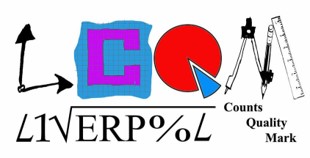
Enrichment
In the EYFS, mathematics takes place throughout the continuous provision activities which build on the lessons taught in small groups or classes. Children in EYFS take part in ‘Wonderful Wednesdays’ which enable the children to deepen their mathematical thinking through baking, building, wet weather activities and field visits. The children are actively encouraged to use skills on a practical level to give context to their learning. After school provisions such as Experiment Club and the EYFS Cookery Club all consolidate the skills further after school hours.
In KS1, mathematical enrichment is seen in the corridors, on the playground and on educational visits. Children are exposed to being more aware of maths in everyday life with questioning and homework challenges. After school clubs offer challenges such as cookery where children are able to use measuring skills, develop their skills in sharing and see the concept of time management in real life whilst cooking. On the playground, activities are provided to encourage the children to use their knowledge of maths in many ways. Teaching and support staff regularly share their use of maths at home and set challenges for the children to accomplish such as- ‘How many sandwiches do I need to make for a party of 12, if each person has 3 each?’
Pupil Voice
Pupil voice is important at Eaton Park Academy, and through our junior leadership team we ensure that all pupils have a say in the curriculum as often as possible. Pupil surveys take into account the views of individuals and pupil feedback is important to us.
Ensuring that our pupils understand that maths is a life skill, and not just something we do in maths lessons is important to us and pupils have an opportunity to share their maths journeys on the ‘Maths Everywhere’ boards around the school.
‘I love maths lessons, especially when we can work as a team to solve problems’’. Harry, Year 2.
‘I spent a pound in the shop, I knew it was a pound coin because I learnt it in school’. Nichelle, Year 3.
‘I am good at counting’ Emily, Nursery.
‘I enjoy recap slides because we do lots of different things, which helps me to remember more,’ Jude, Year 6.
‘I love thinking about how maths links to my learning in other lessons.’ Gracie, Year 5.
Maths at Eaton Park
Subject leader: Mr Williams and Mrs Thorne
Subject Coach: Mrs Bell
Link governor: Anthony Simpkin
Intent
Mathematics is a tool and a skill that we believe all of our pupils need to acquire and master to be successful in life and in other aspects of the curriculum. It is a whole network of concepts and relationships which provide a way of viewing and making sense of the world. It is used to analyse and communicate information and ideas and to tackle a range of practical tasks and real life problems. It also provides the materials and means for creating new imaginative worlds to explore. At Eaton Park Academy, we use a mastery approach to mathematics in all of our teaching, ensuring that children are able to apply the curriculum in a more complex and in-depth way. Mastery in maths demonstrates how skilfully a child can apply their learning – it is not just knowing a fact, but using that fact in increasingly more complex and abstract situations across a range of mathematical strands.
Using the 2014 National Curriculum for Mathematics, it is our aim to develop:
We would like to introduce ourselves as Mr Williams and Mrs Thorne – the maths leaders here at Eaton Park Academy. Within this role, we oversee mathematics from Nursery to year 6 ensuring that our children are prepared for their next step in their educational journey. We are dedicated to fostering a love for mathematics and nurturing a growth mindset in our pupils. We see success in Mathematics as a powerful tool for social mobility, giving children the knowledge, communication skills and problem-solving ability to be productive citizens in every aspect of life. Through engaging, practical lessons, and real-world applications, we aim to develop strong numeracy skills and problem-solving abilities. Our goal is to empower students to think critically, communicate mathematically, and approach challenges with resilience and confidence. By creating a supportive and inclusive learning environment, we strive to ensure that every child reaches their full potential in mathematics and is prepared for success in the future. We adopt a ‘mastery’ approach to Mathematics, prioritising success for all children in every lesson through skilful teaching and the use of manipulatives and pictorial representations to represent mathematical concepts. We aim to ensure that all children can achieve with the use of quality scaffolds and impactful support within lessons to allow them to reach their full potential.
During lessons, pupils are supported in a safe and calm environment where mistakes are celebrated as key learning opportunities, which in turn encourages children to take more risks in their maths lessons, removing the fear of being wrong. As leaders, we ensure that training is provided for staff through a range of opportunities. Such as: sharing best practice across the academy and trust; externally provided courses; self-directed training online and through teaching and learning meetings. We regularly meet with our key link governor, Mr Simpkins and Mr Hyder, Alpha Academies Trust Standard Lead for Maths. During these meetings, we discuss and review the standard of maths at Eaton Park, looking at current practice as well as planning next steps.
We aspire for every child to achieve daily success in Maths, leaving each lesson not only with new knowledge but with a love of the subject.
Curriculum
Our curriculum design at Eaton Park Academy focuses on developing a depth of understanding that ensures the children can build on the concepts that they have previously been taught successfully. We understand that particular areas of the curriculum take more time than others and are therefore not restrictive in our long term planning, but instead we allow our staff to be flexible with their planning, suiting the needs of the pupils within each cohort. Planning of lessons is based upon teacher’s Assessment for Learning judgements as well as summative data, and lessons are created and supported with high-quality resources that challenge all pupils. We believe that the concept of mastery can be achieved by all if children are given the time to explore and embed new skills and concepts in a range of ways. Children are constantly shown the same thing in different ways (conceptual variation) – we believe that taking time with this allows children to make better links and to become deeper thinkers and learners in maths.
At Eaton Park, we wish our children to have a strong understanding of the place value of numbers, applying this to calculation methods both mentally and in writing. We use our displays to model and support the children’s ability to justify and explain their mathematical reasoning when solving questions – this in turn means children begin to notice when their answers seem unreasonable and can correct them independently. We champion the idea of making mistakes, encouraging children to develop resilience when problem solving and instilling the MASTER values of enthusiasm and success. Our children develop a good understanding of spatial awareness and shapes and can interpret a range of graphs accurately. Staff encourage and nurture every pupil’s ability to make links and see relationships and patterns between the different mathematical strands.
Our sequences and lessons follow the system of fluency, reasoning and problem solving – during all lessons, resources are geared to moving children towards being able to apply their basic skills in a wider range of situations with an increasingly complex style. Maths is further supported in other areas of our curriculum, most especially in geography and science, which allows learning to become more meaningful and inspires the children to apply maths in other contexts.
Mastery within the curriculum
Mastery within mathematics is achieved when a child has become secure in a concept, securing it within their long-term memory, which allows them to utilise the information in other contexts with confidence and ease. Mastery at Eaton Park is shown through these three elements:
Fluency – a child’s understanding of the basic skills, facts and concepts
Reasoning – how well a child can articulate their understanding of a skill
Problem solving – solving problems, testing out ideas and using different processes to reach an answer/s
Maths is taught as a whole class at Eaton Park to ensure that children are all given the same level of exposure to the curriculum content areas. By using a range of scaffolds, we are able to support children in achieving their learning outcomes. These can be in the form of T.A support, concrete apparatus, modelling, worked examples and visual representations. The aim is that these are temporary levels of support which can be removed as children become increasingly confident and independent.
Our inclusive approach to the teaching of maths helps pupils to achieve mastery through the development of mathematical fluency which is built upon within each lesson. Within our quality first teaching, we aim to focus on the depth of learning, rather than accelerating through new learning. This supports pupils in becoming fluent mathematicians who are able to apply their skills confidently in a range of contexts, both when reasoning and problem solving.
Our pupils are encouraged to be independent learners, taking risks and making mistakes are celebrated as a way to learn and improve. Children work through clear and progressive activities which stretch and challenge them appropriately.
It is clear as soon as you enter any maths lesson within Eaton Park that our pupils thoroughly enjoy their learning and that they are not fazed by challenge, but instead thrive upon it.
Early Years Foundation Stage
The EYFS mathematics curriculum is a rich curriculum which allows children to develop a secure understanding of number to ensure that they are able to excel mathematically.
Our maths lessons are very practical, hands-on and driven by mathematical vocabulary. Children are encouraged to reason and explain their answers, giving justifications behind their thinking.
Our aim is for the children to become confident in core mathematical skills and to develop a secure base of knowledge which can be built upon as they enter KS1. We want pupils to develop their ‘number sense’, enabling them to understand numbers and their relationships
Within EYFS, our children are encouraged to explore the many maths areas both inside and outside of the classroom. The activities are practical and have a focus around using concrete apparatus such as Numicon and counters to support them in achieving the learning outcomes. There are also plenty of opportunities for children to explore mathematical concepts and broaden their curiosity through exciting maths activities within sand and water as well as problem solving activities.
Objectives for learning within mathematics are derived from the Development Matters document for each stage of development to ensure that teaching is progressive across the EYFS department and within year bands. This then leads to the expectations outlined in the Early Learning Goal which are outcomes that we aim for the pupils to achieve at the end of Reception.
Assessment in EYFS is carried out through guided activities with the children; planned observations; incidental observations and through teacher knowledge of the children. All assessment evidence is stored within the child’s individual online learning journeys (Learning Book) or maths books. Evidence gathering within maths takes the form of observations, photographs and children’s work, both guided and independent within the continuous provision.
Cross curricular maths
The National Curriculum document for maths states that maths should ‘support learning across the curriculum’, and this is why our learning links where possible back to maths. This could be through using, creating and analysing graphs in science or geography. Measuring is a key skill that children utilise through the elements taught in Design and Technology lessons, our Creation Station is the perfect place for children to practically measure food ingredients whilst also developing a key life skill: cooking. Counting beats and understanding the value of different notes in music lessons is another opportunity for exploring maths, understanding halving the value of a crotchet to get a quaver and so on. Through map work, children can explore co-ordinates in context, looking at OS maps to create increasingly more complex co-ordinates. In Y6, these position and directional skills linked to map work are used by children to complete orienteering tasks. Shapes are explored in art and through design too. We also encourage children to see maths outside of the school curriculum and how people use maths in everyday life. Our sports coach continually considers how to build ‘Active Maths’ into his lessons, thinking about problem solving whilst exercising or even sometimes making graphs to show their progress in athletics.
Our focus on Maths is Everywhere is key in all of our learning and is showcased on displays in each of our corridors and via classroom doors – staff and pupils are able to share with each other where and when they have used maths in and out of the classroom.
The National Curriculum document for maths states that maths should ‘support learning across the curriculum’, and this is why our learning links where possible back to maths. This could be through using, creating and analysing graphs in science or geography. Measuring is a key skill that children utilise through the elements taught in Design and Technology lessons, our Creation Station is the perfect place for children to practically measure food ingredients whilst also developing a key life skill: cooking. Counting beats and understanding the value of different notes in music lessons is another opportunity for exploring maths, understanding halving the value of a crotchet to get a quaver and so on. Through map work, children can explore co-ordinates in context, looking at OS maps to create increasingly more complex co-ordinates. In Y6, these position and directional skills linked to map work are used by children to complete orienteering tasks. Shapes are explored in art and through design too. We also encourage children to see maths outside of the school curriculum and how people use maths in everyday life. Our sports coach continually considers how to build ‘Active Maths’ into his lessons, thinking about problem solving whilst exercising or even sometimes making graphs to show their progress in athletics.
Our focus on Maths is Everywhere is key in all of our learning and is showcased on displays in each of our corridors and via classroom doors – staff and pupils are able to share with each other where and when they have used maths in and out of the classroom.
Times Tables
Times tables are a fundamental part of many mathematical areas that children encounter as they enter years 5 and 6 – this is why the National Curriculum outlines that children should be confident with their knowledge of the multiplication facts up to 12 x 12 and the related division facts by the end of year 4.
Children in years 2-5 have specific times table lessons each week, where their understanding of times tables is deepened and secured. They will explore the patterns and links with the multiplication table allowing them to not simply recall the facts but use them to reason and problem solve. We have also devised our own times tables assessment tool: The Times Tables Rainbow. Each week, children are tested on individual tables as they move along the rainbow, aiming to reach the pot of gold at the end. To support the children further, they are sent home with login details for TT Rockstars, which encourage children to practise their current table once a day at home. Times Tables Rockstars, where the children can practice their skills to earn coins to spend on their rockstar, is a great platform for our pupils. Times Tables Rock Stars: Play (ttrockstars.com) We enter regular competitions both in the city and nationally too whilst also competing in school against our peers. As a result, children take ownership of their times tables learning.
Our approach ensures that times tables remain fun and is supported by staff’s use of games, apps and activities that further embed the children’s times tables knowledge into their long-term memory. Our Times Tables Rainbow is positively reinforced by staff using rewards on our behaviour system.
Assessment
Assessment is a daily process that takes place within every maths lesson – a huge part of this is our use of intervention marking, which allows us to pick up on key misconceptions within the lesson and to address them straight away. Assessment for Learning is an integral part of each teacher’s day to day practice. It is informed by pupil responses and is used to provide individualised learning opportunities, including additional challenge or tailored support. This assessment for learning can be in the form of high-quality questioning, pupil-teacher discussions and in the moment marking. Next steps are provided within maths lessons, as appropriate to provide additional challenge and/or the opportunity to apply learning.
Summative assessments systems are in place at the end of each term and half term to allow staff to monitor pupil progress in maths and to ensure that learning has been effective. The data provided from these assessments is then utilised by staff to inform future planning to plug gaps and to move pupils on. Teachers complete assessment trackers to help them to inform their judgements of children by analysing how secure children are in different areas of the mathematics curriculum.
Statutory Assessments
Here at Eaton Park Academy, we follow the National Curriculum, and this requires that each child is assessed at the end of KS1 and KS2. Statutory tests (SATS) determine whether the children are working below, at or above the expected standard. In KS1, the assessments form part of the final judgement, along with teacher assessment to form the overall standard the children reach. In KS2, the children will sit mathematics papers in May. In KS1, the children will complete an arithmetic and a reasoning paper, and in KS2 they complete 2 reasoning papers along with the arithmetic. In Y4 during June, our children sit the statutory Multiplication Tables Check (MTC) to assess their multiplication tables knowledge and recall.
SMSC and maths
In Mathematics we try to develop the spiritual, moral, social and cultural well-being of pupils through the teaching and learning within the lessons and through extra-curricular activities. Our Maths teaching actively encourages risk taking which enables students to explore and try new ideas without the fear of failure. Spiritual Development is encouraged through deep thinking and questioning the way in which the world works, this promotes the spiritual growth of children. In Maths lessons all pupils are encouraged to delve deeper into their understanding of Mathematics and how it relates to the world around them. Moral Development in Mathematics teaches pupils to develop self-confidence within mathematics, and to build their self-esteem within the subject. Social Development in Mathematics is deepened with problem solving skills and teamwork activities which are fundamental to Mathematics, through creative thinking, discussion, explaining and presenting ideas. Pupils are always encouraged to develop their Mathematical reasoning skills, communicating with others and explaining concepts to each other.
Liverpool Counts Quality Mark
In 2022, we were proud to be awarded the Liverpool Counts Quality Mark as an academy. This quality marks recognises children’s love and appreciation of maths and reflects that at Eaton Park ‘Maths is Everywhere’. We achieved this through the use of interactive maths displays for both the staff and children as well as continuing to make links with maths in the foundation subjects, giving children exposure to maths at every available opportunity. Whether it be through PE and measuring their distances and times or in science being able to draw an accurate graph to show the results from an experiment, we want the children to find pleasure in using their maths skills in other ways and to take pride in this fact.
As a school, we take part in special maths days such as ‘Number Day’ and ‘World Maths Day’. During these days, we like to emphasise the use of real life maths and use continuous provision style activities across the whole school to enable children to apply their learning to a variety of real life contexts. Our class Maths Ambassadors are also champions of real life maths and are responsible for updating the maths is everywhere display boards with real examples from both their peers and teachers, helping to run playtime maths clubs to support their peers with homework and also being responsible for collecting money in for the class when needed. The quality mark has made us as subject leaders consider how maths can be brought into assemblies, themed weeks, newsletters, and so we are now making more of an effort to weave maths even more so into our everyday school routine.

Enrichment
In the EYFS, mathematics takes place throughout the continuous provision activities which build on the lessons taught in small groups or classes. Children in EYFS take part in ‘Wonderful Wednesdays’ which enable the children to deepen their mathematical thinking through baking, building, wet weather activities and field visits. The children are actively encouraged to use skills on a practical level to give context to their learning. After school provisions such as Experiment Club and the EYFS Cookery Club all consolidate the skills further after school hours.
In KS1, mathematical enrichment is seen in the corridors, on the playground and on educational visits. Children are exposed to being more aware of maths in everyday life with questioning and homework challenges. After school clubs offer challenges such as cookery where children are able to use measuring skills, develop their skills in sharing and see the concept of time management in real life whilst cooking. On the playground, activities are provided to encourage the children to use their knowledge of maths in many ways. Teaching and support staff regularly share their use of maths at home and set challenges for the children to accomplish such as- ‘How many sandwiches do I need to make for a party of 12, if each person has 3 each?’
Pupil Voice
Pupil voice is important at Eaton Park Academy, and through our junior leadership team we ensure that all pupils have a say in the curriculum as often as possible. Pupil surveys take into account the views of individuals and pupil feedback is important to us.
Ensuring that our pupils understand that maths is a life skill, and not just something we do in maths lessons is important to us and pupils have an opportunity to share their maths journeys on the ‘Maths Everywhere’ boards around the school.
‘I love maths lessons, especially when we can work as a team to solve problems’’. Harry, Year 2.
‘I spent a pound in the shop, I knew it was a pound coin because I learnt it in school’. Nichelle, Year 3.
‘I am good at counting’ Emily, Nursery.
‘I enjoy recap slides because we do lots of different things, which helps me to remember more,’ Jude, Year 6.
‘I love thinking about how maths links to my learning in other lessons.’ Gracie, Year 5.
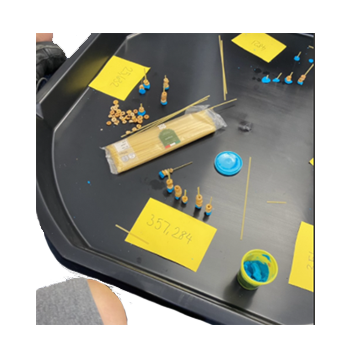
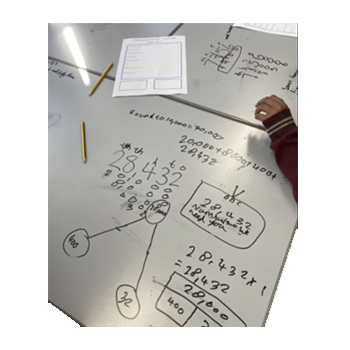
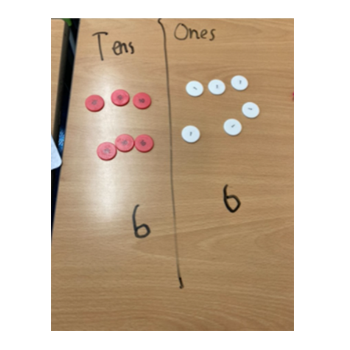
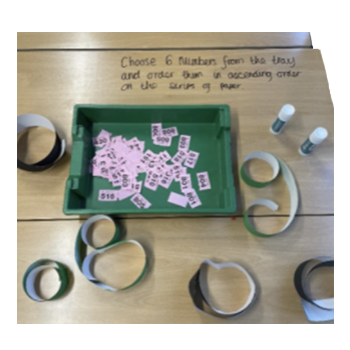
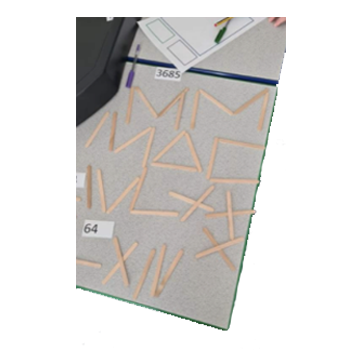
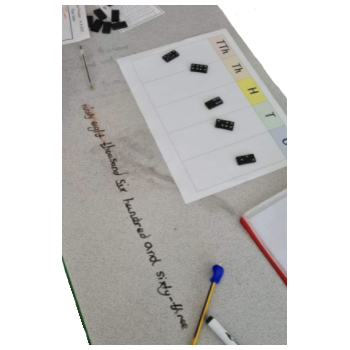
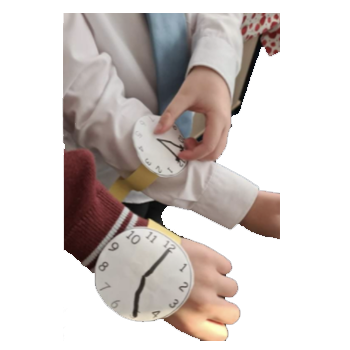
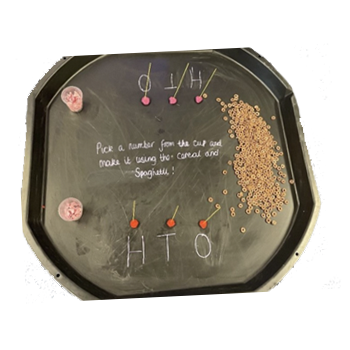
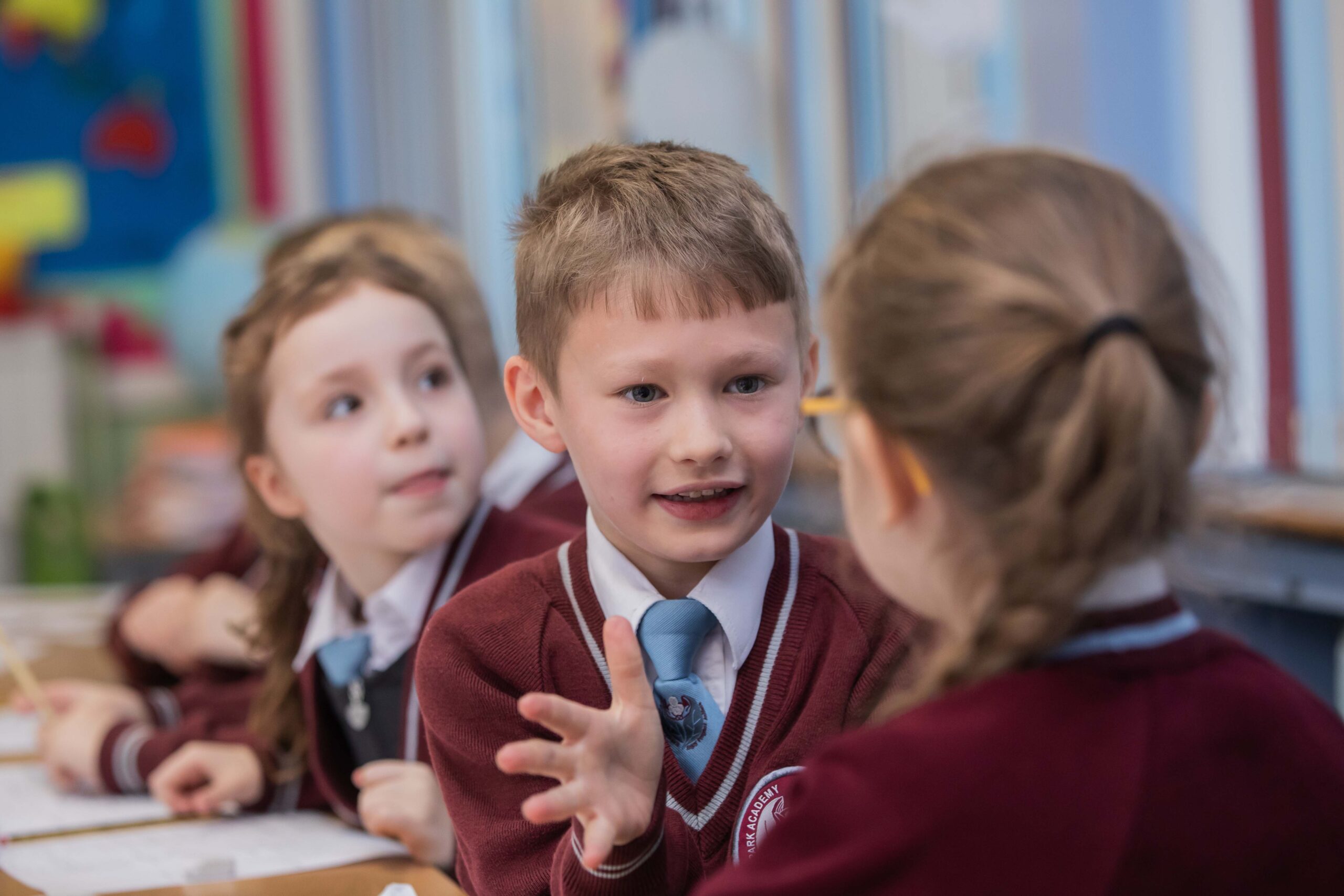
Eaton Park Academy has been at the heart of our community for many years.
Our ambitious curriculum is shaped around the pupils and the community in which we serve.
Here you can find a collection of our latest news. We aim to keep all stakeholders as up-to-date as possible.
We are delighted to announce that Eaton Park has been awarded the Excellence in Music…
The government has launched a national campaign to remind parents and carers of the importance…
At Eaton Park Academy, ensuring the safety of our beloved students is our utmost priority.…
Tuesday 30th January 2024: Year 1 took part in our Kings and Queens workshop! 🫅👸…
Monday 29th January 2024: Year 5 travelled back in time to the Tudor Period to…
What fantastic trips to Chester Zoo Eaton Park has had! 🤩 The trips during the…
🏃🏼♀️🏃🏻♂️🏆Sportshall Athletics 🏆🏃🏻♂️🏃🏼♀️ On Monday 20th November, Eaton Park’s Sportshall Athletics team travelled to Fenton…
Yesterday, 80 families attended the Bread and Butter Thing @ The Bentilee Family Hub. A big thank you to all the volunteers,…
Alpha Academies Trust are very excited to be part of the collaborative approach to the…
If you require a paper copy of any of the pages / documents published on this website, please click here and complete the form stating which page(s) / document(s) you require along with your name and address.